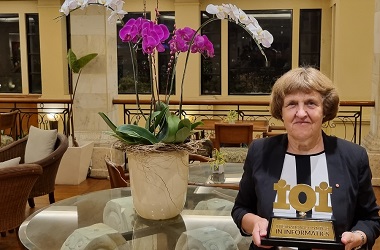 Professor Valentina Dagienė shares her charisma, enthusiasm, and scientific knowledge with more than just Vilnius University (VU); her achievements and work have travelled the world. She is probably the only scientist whose work is known to everyone from a Lithuanian fifth-grader to a Japanese teacher. In August this year, at the International Olympiad in Informatics (IOI) held in Indonesia, Prof. Dr. V. Dagienė of the Institute of Data Science and Digital Technologies, Faculty of Mathematics and Informatics (VU), was presented with an exclusive award for her services to the IOI community.
Professor Valentina Dagienė shares her charisma, enthusiasm, and scientific knowledge with more than just Vilnius University (VU); her achievements and work have travelled the world. She is probably the only scientist whose work is known to everyone from a Lithuanian fifth-grader to a Japanese teacher. In August this year, at the International Olympiad in Informatics (IOI) held in Indonesia, Prof. Dr. V. Dagienė of the Institute of Data Science and Digital Technologies, Faculty of Mathematics and Informatics (VU), was presented with an exclusive award for her services to the IOI community.
The conference highlighted that in 2007, V. Dagienė initiated and annually organizes the IOI conference on research in educating students with IT skills around the world, and founded the international peer-reviewed scientific journal Olympiad in Informatics, which is still published annually. V. Dagienė has served on the IOI Olympiad’s International Committee for thirteen years.
V. Dagienė talked to VU News about her work, achievements, and motivation.
For many years, you have been involved in computer science education around the world, and with it, the student Olympiads. What motivates you to be so actively involved in computer science education?
In general, I am motivated by the opportunity to improve children’s learning, to have at least some influence on education, to help not only Lithuania but also different countries to teach better, to involve children from an early age, to help them experience the beauty of science - informatics, mathematics. It’s also about finding and nurturing children with an aptitude for computer science.
You have served on the International Committee of the IOI Olympiad for thirteen years. What was your path to this Committee?
For many years before that, I organized the Lithuanian Olympiad in Informatics, prepared assignments for the School of Young Programmers, wrote methodological articles for teachers, and led seminars. I had a lot of contacts with schools and teachers. My research work is related to informatics didactics and education.
What is the responsibility of the IOI community? Which countries are in the community?
The IOI community makes it possible for the most talented students to come and challenge themselves. There are many countries; the event annually gathers students from 85-90 countries.
What have been the biggest challenges over the years?
There have been a lot of things, including political disagreements, such as some countries not being allowed to enter other countries (Israel was not accepted this year in Indonesia). Also, all kinds of subject-specific decisions - which programming languages to use, how to present tasks to students, etc. In addition, I’ve set up a conference during the Olympiads, I organize it every year, collect papers, and publish a volume of the Olympiads in Informatics magazine.
What changes do you see in the international informatics community? How does Lithuania look in this context?
Students are getting smarter, and we need to adapt to new opportunities. Lithuania stays around the middle, sometimes above the average. We would love to get gold medals (it’s been a long time since we’ve got one), but it requires more investment - time with the students and, of course, the teachers. After all, school teachers are the first coaches of future Olympiad participants.
2022-09-09